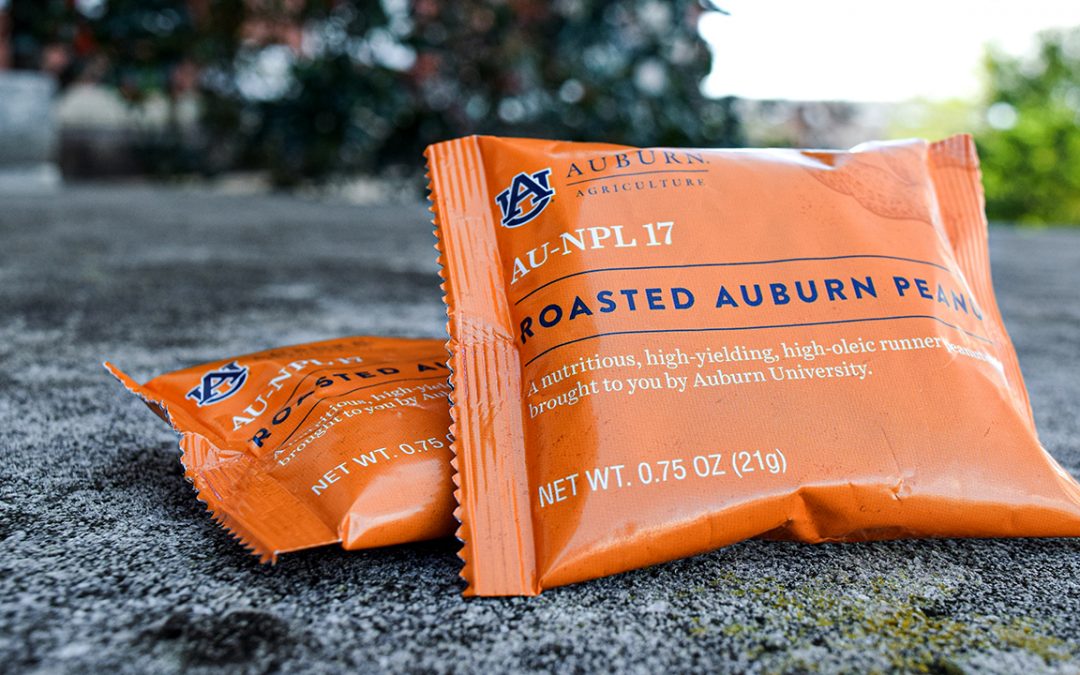By Paul Hollis / May 27, 2020 10:49:23 AM
Auburn University’s first foray into the peanut breeding business appears to be a success, with AU-NPL 17 showing promise in multiple trials as a variety that can take hits from major diseases and still produce a high-yielding product with healthy attributes.
AU-NPL 17 was released in 2017 by a peanut breeding program operated jointly by the College of Agriculture’s Department of Crop, Soil and Environmental Sciences and USDA’s National Peanut Research Lab in
Dawson, Georgia.
“AU-NPL 17 has been involved in peanut variety performance trials in South Carolina, Georgia, Florida, Alabama and Mississippi since 2018, and it has performed very well,” said Charles Chen, a former USDA Agricultural Research Service research geneticist who, in early 2012, joined the College of Agriculture and is a professor of peanut breeding and genetics and head of the college’s peanut breeding program. “It is also being grown successfully in farmer fields in Alabama, Florida and Georgia.”
Auburn’s new peanut variety is a “runner type,” meaning it is most commonly used for making peanut butter. In addition to being grown in Alabama, runners also are grown in Georgia, Texas, Florida, South Carolina, Mississippi and Arkansas. They account for 80 percent of the estimated 1.4 million acres of peanuts grown in the United States, with Alabama growers planting approximately 157,000 acres this past year.
Auburn’s breeding program is the youngest of its kind in the nation, but the release and subsequent performance of AU-NPL 17 has created a solid foundation for its future.
“Dr. Chen has more outstanding peanut germplasm and advanced breeding lines that will be considered for release in the next year or two,” said John Beasley, professor and head of the Department of Crop, Soil and Environmental Sciences. “He has a significant amount of genetic diversity in the lines he is evaluating and advancing. He uses these lines to increase the diversity in his crosses to develop cultivars for Alabama growing conditions.”
Particular strengths of AU-NPL 17 include its high-oleic fatty acid content; strong resistance to tomato spotted leaf virus, leaf spot and white mold; and a very competitive high yield, Chen said.
“AU-NPL 17 has a medium maturity of 145 days in the Southeastern growing region,” he said. “It has very strong resistance to tomato spotted wilt virus, is highly tolerant to leaf spot, has very good resistance to white mold, and has superior shelling characteristics.”
The variety has a prostrate growth habit with a main stem and large vines, Chen said, along with a very decent grade.
AU-NPL 17’s high-oleic trait means it contains a higher amount of oleic acid compared to standard peanuts. Oleic acid is a monounsaturated fatty acid, also known as a “good fat,” that reduces the amount of LDL (bad cholesterol) while boosting the levels of HDL (good cholesterol). Monounsaturated fats are commonly found in foods such as nuts, seeds, olive oil, canola oil and avocados. This trait also substantially improves the shelf life of peanuts and peanut products.
The peanut industry is now demanding a high-oleic peanut, with some companies, like Mars Chocolate, committed to using 100-percent high-oleic peanuts in all of their products.
“We don’t produce as many high-oleic peanuts in the U.S. as countries such as Argentina and Australia, and that hurts our competitiveness internationally,” Chen said. “I believe high-oleic will provide more options for the U.S. peanut industry.”
AU-NPL 17 also adapts very well in non-irrigated situations, Chen said.
Kris Balkcom, research associate and extension specialist in Alabama’s Wiregrass region, has seen first-hand how AU-NPL 17 has performed in the southeast portion of the state, and he sees definite strengths in the variety.
“I think the biggest strength is that it has one of the best disease packages available in a high-oleic variety,” Balkcom said. “I see it performing more consistently in high-pressure disease areas. Its package gives producers some flexibility considering the high cost and range of different fungicides. I still don’t think we have a silver-bullet variety, but AU-NPL 17 offers us some advantages to our variety selection with its high-oleic trait and disease package.”
While Auburn breeders had hoped there would be about 500,000 pounds of Foundation Seed available for planting this year, severe weather conditions at harvest in 2019 have knocked that number down to 200,000 pounds.
Next up for the Auburn peanut breeding program is a Virginia-type peanut that is currently being tested by Hampton Farms, headquartered in Severn, North Carolina, and the leading roaster of in-shell peanuts in the United States.
The largest of all peanuts, the Virginia peanut is also known as the “ballpark” peanut and is often used in gourmet snacks. Virginia peanuts account for about 15 percent of total U.S. production.
“We will plant one acre of this variety for breeder seed production in 2020 at the Wiregrass Research and Extension Center,” Chen said. “If everything goes well, we will release the variety in 2021. We don’t have an official name yet.”
The Virginia-type peanut is high oleic, high yielding and has shown very strong resistance to tomato spotted wilt virus, leaf spot and white mold. It is a very suitable to boiling peanut market with very good flavor, he said.
Auburn University also has cotton and soybean breeding programs led by Assistant Professor Jenny Koebernick. Her cotton program is focused on addressing the cotton leaf roll dwarf virus issue, reniform nematode resistance and improved cotton fiber quality, among other breeding objectives. Her soybean breeding program is focused on oil quality traits, especially high-oleic soybean oil.
“Both Dr. Chen and Dr. Koebernick are developing strong and well-recognized breeding programs with a strong team approach to develop crop cultivars that improve the production efficiency of our Alabama producers,” Beasley said.
The certified seeds of AU-NPL 17 are available for the 2020 growing season from the Alabama Crop Improvement Association in Headland.

